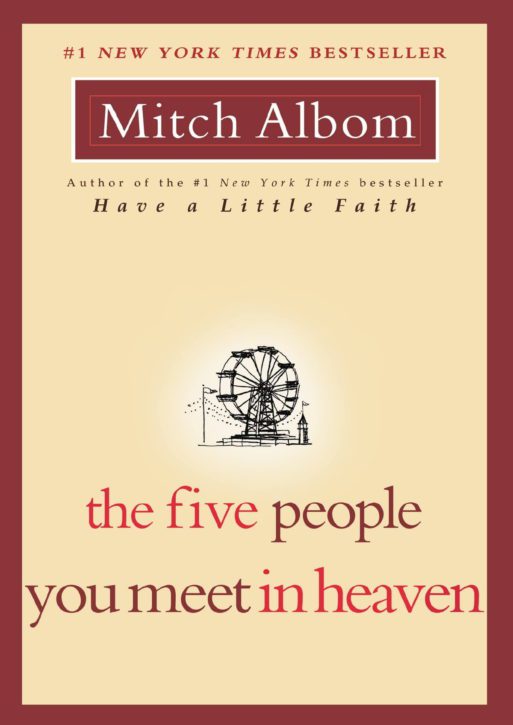 Mitch Albom’s The Five People You Meet in Heaven reverses its order by starting with his protagonist’s (an elderly man) death on his own birthday. Then, he carefully intertwines the details of his life through each of his encounters with the five people who have been assigned for the protagonist to meet in heaven. Every meeting with these five people involves each of them imparting an important life lesson that they learned after their deaths, as well as answers to the outcomes of events that have haunted, for example, Eddie for the majority of his life. The book also shifts during chapters and gives readers glimpses of other milestone birthdays for the protagonist.
Mitch Albom’s The Five People You Meet in Heaven reverses its order by starting with his protagonist’s (an elderly man) death on his own birthday. Then, he carefully intertwines the details of his life through each of his encounters with the five people who have been assigned for the protagonist to meet in heaven. Every meeting with these five people involves each of them imparting an important life lesson that they learned after their deaths, as well as answers to the outcomes of events that have haunted, for example, Eddie for the majority of his life. The book also shifts during chapters and gives readers glimpses of other milestone birthdays for the protagonist.
Eddie is a curmudgeonly elderly amusement park maintenance worker who spends each day performing his routine activities with pain and slowness. On what happens to be his 83rd birthday, an accident on a ride happens at the park. While trying to save a little girl, death arrives for Eddie. Thus begins an emotionally powerful and instructive journey to heaven.
“Eddie is a curmudgeonly elderly amusement park maintenance worker who spends each day performing his routine activities…”
From the beginning of his arrival in heaven, Eddie ponders several major questions, such as “Where is my worry?” and “Where is my pain?” He gradually learns that the first step in heaven is to meet with the five people who have been personally chosen for him. The Five People You Meet in Heaven demonstrates that the people selected could be anyone, even a stranger distantly connected to how the person who died lived on Earth.
These five people represent mentors for those who have just passed, providing Eddie with the wisdom they learned during their first steps. This wisdom, which can also serve as a tool for readers in living fulfilled lives, includes gems like “no life is a waste,” “you get to make sense of your yesterdays” and “holding anger is a poison…No one is born with anger. And when we die, the soul is freed of it.” These pieces of advice aid in enlightening Eddie on the most important aspects of life that he might have taken for granted or might have found pretty mundane.
“No one is born with anger. And when we die, the soul is freed of it.”
–The Five People You Meet in Heaven
In the midst of Eddie undergoing the learning and processing of these lessons, Mitch Albom includes snippets of Eddie’s past birthdays and major life events that might have happened then, so that readers can understand how the protagonist became the man he is at his arrival into heaven. There are also occasional moments where the book continues Eddie’s story from the various points of view of those he left behind. Additionally, we get a glimpse into the postmortem events that occur on Earth.
Eddie’s initial reluctance and struggle to accept the harsh realities of what he could have done better in his life allows Mitch Albom’s readers to cheer for and care about him. The Five People You Meet in Heaven also allows readers the opportunity of relating to and reflecting on how they can improve and cherish their lives before their own death. In essence, it should not take a journey to heaven for humans to realize what means the most to them and live life to the fullest. However, Mitch Albom’s concept of encountering five people who can teach you something and allow you to feel less alone and more prepared for your future in heaven is beautiful; it captures how important it is for humans to possess social relationships with each other rather than suffering setbacks and hardships alone.
More SevenPonds Book Reviews:
- Book Review: “A Grief Observed” by C.S. Lewis
- Book Review: “Final Rights: Reclaiming the American Way of Death” by Joshua Slocum and Lisa Carlson
- Classic Book Review: As I Lay Dying, by William Faulkner

 ”The Five People You Meet in Heaven” by Mitch Albom
”The Five People You Meet in Heaven” by Mitch Albom


 Passing of Beloved Comedian Births a New Comedy Festival
Passing of Beloved Comedian Births a New Comedy Festival

 The Spiritual Symbolism of Cardinals
The Spiritual Symbolism of Cardinals















This is a nice site
Report this comment
I am currently in the midst of reading this book, and thus far have very much enjoyed it. I noted that Albom uses very short, choppy syntax and sentence structure; This must be intentional, as a way to allow readers to connect with Eddie on a more thoughtful level. Reading his book feels as though I am having a conversation or listening to Eddie’s thoughts. What do you think about his active choice of shorter and less varied sentences?
Report this comment